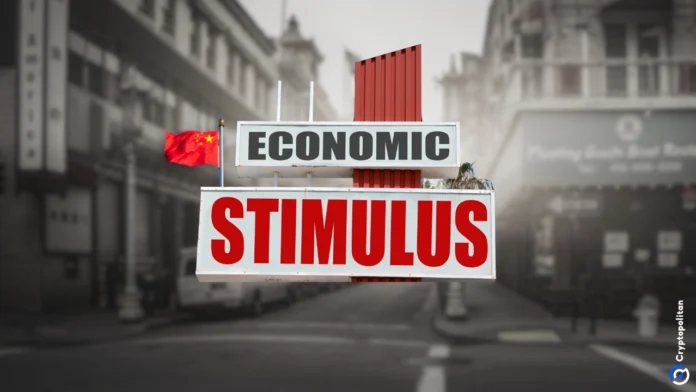Collins J. Okoth
China finally unveiled its much-anticipated stimulus package today, Friday, November 8. The report revealed China’s plans to allow local governments to issue an additional $827.7B (6T yuan) in bonds over the next three years to address “hidden debt.”
Although the People’s Bank of China had already cut interest rates several times before, analysts emphasized that China needed to spend up to $1.4T annually over three years to reflate its economy after a prolonged property slump.
However, major spending and government debt increases required the approval of the National People’s Congress, which happened on Friday, November 8. Consequently, the local government’s special bonds issuing ceiling was raised from 29.52T yuan to 35.52T yuan.
China’s economic lifeline depends on new fiscal stimulus plan
China will let local governments issue an additional $837.7 billion in bonds to swap for off-balance sheet or ‘hidden’ debt over three years, an official said, in a crucial step to lower systemic risks in the flagging economy
— Reuters (@Reuters) November 8, 2024
China unveiled its plans for more stimulus today as parliamentary meetings that began on Monday ended. While state media Xinhua reported that Beijing had not disclosed the scale of the stimulus measures, Chinese officials increased the amount of local government debt that could be issued to over $800B.
Minister of Finance Lan Fo’an emphasized at a press conference last month that the planned fiscal support needed to address problems with the local government’s hidden debt, which stood at over 14 trillion yuan by the end of 2023. Authorities planned to trim it to 2.3 trillion yuan by 2028. The IMF confirmed that the combined central and local government debt was 147 trillion yuan, 117% of the GDP.
Nomura Holdings Inc. estimated that China had 7 to 8.4 trillion dollars in hidden debt and expected Beijing to increase its debt issuance to 10 trillion yuan over the next few years. Nomura said this could potentially save local governments nearly 300 billion yuan in annual interest payments.
The IMF, however, estimated that debt swaps in the current stimulus package will help save 600 billion yuan in 5-year interest.
China appeared to focus more on addressing its economy’s long-term structural issues with the just-approved stimulus package. Previous steps were seemingly aimed at keeping the economy afloat rather than sparking a robust recovery. Analysts were also cautious as they warned that Beijing could remain conservative about issuing direct consumer support.
In recent weeks, Beijing signaled a growing concern about the economy’s sluggishness as it tried to achieve its 5% annual growth goal. The longer-term goals of transforming China into a green energy and high-tech economy still seemed likely to stay at the forefront of Beijing’s agenda.
The NPC approves special bonds to recapitalize large state banks
The National People’s Congress planned to recapitalize large banks by approving an additional 6 trillion yuan in special sovereign bonds. Economists and Goldman Sachs analysts said the government will likely raise the official fiscal deficit target from 3% this year to 3.8% of GDP in 2025.
Analysts warned that tackling local government debt in this way is recommended for financial stability as it could boost consumption if it led to the payment of supplier arrears and civil servant salaries, but it would not have a positive effect on demand.
Leah Fahy, China economist at Capital Economics, agrees, saying, “Any additional borrowing approved for these policies won’t provide much of a fiscal boost.”
Larry Hu, Macquarie economist, also warned that the stimulus mainly aimed at meeting official growth targets. He added that the stimulus measures are so far sufficient to achieve a 5% GDP growth this year but barely enough to reflate the economy as the confidence of homebuyers and consumers remains low.
Some analysts highlighted the importance of today’s National People’s Congress approval of the stimulus package, pointing out that fiscal easing is key to the ongoing stimulus plans. However, they warned that China needs to target fiscal spending on local government debt and households to rekindle confidence in the world’s second-largest economy.
